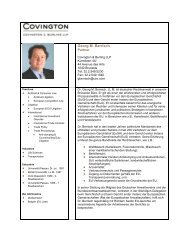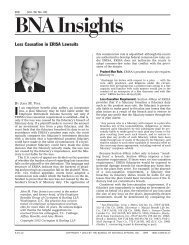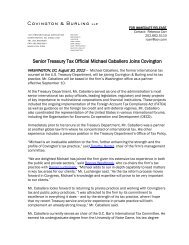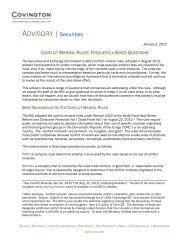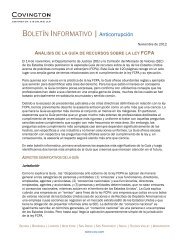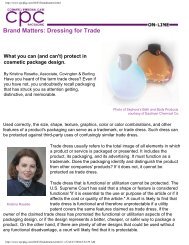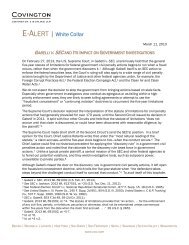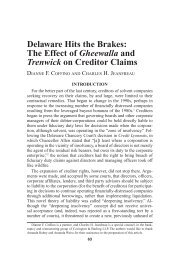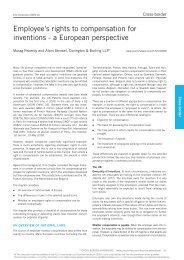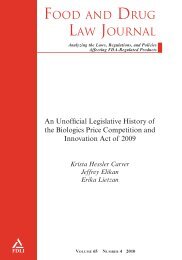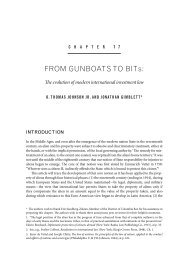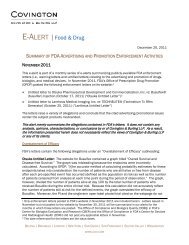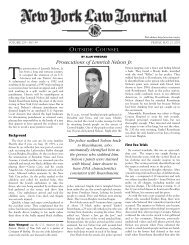Is Litigating Against the SEC an Option for Individuals? - Covington ...
Is Litigating Against the SEC an Option for Individuals? - Covington ...
Is Litigating Against the SEC an Option for Individuals? - Covington ...
Create successful ePaper yourself
Turn your PDF publications into a flip-book with our unique Google optimized e-Paper software.
In early December 2006, Linda Chatm<strong>an</strong> Thomsen, <strong>the</strong><br />
nationwide head of en<strong>for</strong>cement <strong>for</strong> <strong>the</strong> Securities <strong>an</strong>d<br />
Exch<strong>an</strong>ge Commission (<strong>SEC</strong>), touted publicly <strong>the</strong><br />
strength of its litigation program, noting that it had won<br />
every single case it had litigated in federal court in<br />
2006. As she put it, “we’re 10 <strong>for</strong> 10.” 1 So, is litigating<br />
against <strong>the</strong> <strong>SEC</strong> a real option <strong>for</strong> individuals?<br />
Yes. While <strong>the</strong> <strong>SEC</strong>’s statement is technically correct,<br />
it is also misleading. In 2006, in at least five cases <strong>the</strong><br />
<strong>SEC</strong> does not include in its calculus, <strong>the</strong> <strong>SEC</strong> lost on<br />
summary judgment. And <strong>the</strong> <strong>SEC</strong> recently suffered<br />
<strong>an</strong>o<strong>the</strong>r loss on summary judgment in February 2007.<br />
Such defeats are just as much a loss as a defeat at trial.<br />
In fact, <strong>the</strong>y are worse because it me<strong>an</strong>s <strong>the</strong> <strong>SEC</strong> lacked<br />
sufficient evidence even to get <strong>the</strong> case to a jury.<br />
Moreover, in three of <strong>the</strong> <strong>SEC</strong>’s “victories,” <strong>the</strong> <strong>SEC</strong><br />
actually lost signific<strong>an</strong>tly at <strong>the</strong> remedies phase of <strong>the</strong><br />
trials.<br />
<strong>SEC</strong>’s Summary Judgment Losses<br />
Let’s first consider <strong>the</strong> summary judgment cases. In<br />
February 2006, a Federal District Court Judge in Los<br />
Angeles gr<strong>an</strong>ted summary judgment <strong>for</strong> Thomas Talbot<br />
(Talbot), a director of Fidelity National Fin<strong>an</strong>cial, Inc.,<br />
rejecting insider trading charges. 2 The <strong>SEC</strong> claimed<br />
Talbot learned material nonpublic in<strong>for</strong>mation in a<br />
Fidelity National board meeting regarding <strong>the</strong> possible<br />
acquisition of Lending Tree. Two days after <strong>the</strong> board<br />
meeting, Talbot purchased 5,000 shares of Lending<br />
Tree, having never previously traded in Lending Tree<br />
securities. The court found that <strong>the</strong> in<strong>for</strong>mation was<br />
nonpublic, might be material, <strong>an</strong>d Talbot used it to trade.<br />
But <strong>the</strong> court concluded that Talbot had no duty to<br />
maintain <strong>the</strong> in<strong>for</strong>mation in confidence because Fidelity,<br />
on whose board he served, owed no duty of confidentiality<br />
to Lending Tree. The court gr<strong>an</strong>ted summary<br />
judgment against <strong>the</strong> <strong>SEC</strong>.<br />
Second, in <strong>SEC</strong> v. Cedric Kushner Promotions, Inc., 3<br />
<strong>the</strong> Federal District Court in New York gr<strong>an</strong>ted summary<br />
judgment <strong>for</strong> defend<strong>an</strong>t Steven Angel, a <strong>for</strong>mer director<br />
of Cedric Kushner Promotions (CKP). The <strong>SEC</strong> had<br />
sued Angel <strong>for</strong> fraud under Section 10(b) of <strong>the</strong><br />
Exch<strong>an</strong>ge Act in connection with CKP’s filing of its<br />
Form 10-KSB on May 20, 2003, which contained unauthorized<br />
computer signatures of <strong>the</strong> comp<strong>an</strong>y’s auditors.<br />
The <strong>SEC</strong> sought monetary penalties <strong>an</strong>d <strong>an</strong> order perm<strong>an</strong>ently<br />
barring Angel from serving as <strong>an</strong> officer or a<br />
director of <strong>an</strong>y public comp<strong>an</strong>y.<br />
Americ<strong>an</strong> Bar Association • Section of Litigation • Securities Litigation Journal • Winter 2007<br />
<strong>Is</strong> <strong>Litigating</strong> <strong>Against</strong> <strong>the</strong> <strong>SEC</strong> <strong>an</strong> <strong>Option</strong> <strong>for</strong> <strong>Individuals</strong>?<br />
By Jamie A. Levitt, David B. Bayless, <strong>an</strong>d Geoff Graber<br />
The court found, however, that Angel had played only<br />
a “very background role” in <strong>the</strong> preparation of <strong>the</strong> Form<br />
10-KSB. Accordingly, <strong>the</strong> court rejected <strong>the</strong> <strong>SEC</strong>’s contention<br />
that Angel could be held liable <strong>for</strong> a primary<br />
violation of Section 10(b) under a <strong>the</strong>ory of “subst<strong>an</strong>tial<br />
participation” in <strong>the</strong> preparation of <strong>the</strong> Form 10-KSB.<br />
The court also rejected <strong>the</strong> <strong>SEC</strong>’s argument that Angel<br />
could be held liable <strong>for</strong> aiding <strong>an</strong>d abetting a violation<br />
of Section 10(b). The court gr<strong>an</strong>ted summary judgment<br />
against <strong>the</strong> <strong>SEC</strong>.<br />
But summary judgment was not <strong>the</strong> end of <strong>the</strong> story<br />
in Angel’s case. Three months after gr<strong>an</strong>ting summary<br />
judgment, <strong>the</strong> court<br />
ordered <strong>the</strong> <strong>SEC</strong> to pay<br />
Angel’s attorney fees <strong>an</strong>d<br />
costs under <strong>the</strong> Equal<br />
Access to Justice Act. 4<br />
The court found that <strong>the</strong><br />
<strong>SEC</strong> had no subst<strong>an</strong>tial<br />
justification in pursuing<br />
its action against Angel.<br />
In particular, <strong>the</strong> court<br />
noted that it was “patently<br />
insufficient to state, as <strong>the</strong><br />
<strong>SEC</strong> does, that Angel’s<br />
status as a director alone<br />
justifies <strong>the</strong> imposition of<br />
primary liability [under<br />
Section 10(b)]. Although<br />
The court said<br />
<strong>the</strong> <strong>SEC</strong> “is not<br />
unlike Britney Spears<br />
in its inability to<br />
use quotation<br />
marks correctly.”<br />
a director has certain fiduciary obligations, <strong>the</strong>re is no<br />
evidence that Angel knew of <strong>the</strong> false statements or was<br />
o<strong>the</strong>rwise in a position to remedy <strong>the</strong>m.” The court<br />
awarded Angel more th<strong>an</strong> $53,000 in fees <strong>an</strong>d costs.<br />
Third, in <strong>SEC</strong> v. Todd, 5 <strong>the</strong> Federal District Court<br />
gr<strong>an</strong>ted summary judgment <strong>for</strong> defend<strong>an</strong>t Jeffrey<br />
Weitzen, <strong>the</strong> <strong>for</strong>mer CEO of Gateway, Inc., whom <strong>the</strong><br />
<strong>SEC</strong> had sued <strong>for</strong> fraud regarding certain statements in<br />
<strong>the</strong> third quarter of 2000. But Weitzen had not signed<br />
<strong>the</strong> 10Q <strong>for</strong> <strong>the</strong> third quarter of 2000. (This was pre-<br />
Sarb<strong>an</strong>es-Oxley.) Instead, <strong>the</strong> <strong>SEC</strong> attempted to impute<br />
<strong>the</strong> statements to Weitzen through a <strong>the</strong>ory of “subst<strong>an</strong>tial<br />
participation” <strong>an</strong>d “intricate involvement.” But <strong>the</strong><br />
only evidence <strong>the</strong> <strong>SEC</strong> offered was that Weitzen had<br />
signed <strong>the</strong> m<strong>an</strong>agement representation letter to<br />
Gateway’s auditor. The court concluded that a reasonable<br />
fact finder “could not find this to be subst<strong>an</strong>tial in relation<br />
to <strong>the</strong> preparation of <strong>the</strong> entire quarterly filing” <strong>an</strong>d<br />
so refused to impute <strong>an</strong>y alleged misstatement in <strong>the</strong> fil-<br />
Published in Securities Litigation Journal, Volume 17, Number 2, Winter 2007. © 2007 by <strong>the</strong> Americ<strong>an</strong> Bar Association. Reproduced with permission.<br />
All rights reserved. This in<strong>for</strong>mation or <strong>an</strong>y portion <strong>the</strong>reof may not be copied or disseminated in <strong>an</strong>y <strong>for</strong>m or by <strong>an</strong>y me<strong>an</strong>s or stored in <strong>an</strong> electronic<br />
database or retrieval system without <strong>the</strong> express written consent of <strong>the</strong> Americ<strong>an</strong> Bar Association.
Americ<strong>an</strong> Bar Association • Section of Litigation • Securities Litigation Journal • Winter 2007<br />
ing to Weitzen.<br />
The <strong>SEC</strong> also alleged that Weitzen made false statements<br />
in a press release regarding tr<strong>an</strong>sactions whose<br />
sole purpose was “closing <strong>the</strong> gap” between Gateway’s<br />
<strong>an</strong>ticipated revenue <strong>for</strong> <strong>the</strong> quarter <strong>an</strong>d <strong>an</strong>alysts’ consensus<br />
expectations. But, while Weitzen knew of <strong>the</strong> tr<strong>an</strong>sactions,<br />
<strong>the</strong> <strong>SEC</strong> failed to provide evidence that Weitzen<br />
knew or was reckless in not knowing that <strong>the</strong> accounting<br />
<strong>for</strong> <strong>the</strong>m was improper. Weitzen “was not <strong>an</strong> account<strong>an</strong>t”<br />
nor had <strong>the</strong> <strong>SEC</strong> offered evidence “that he had <strong>an</strong>y<br />
reason to have accounting expertise sufficient to challenge<br />
<strong>the</strong> treatment given to <strong>an</strong>y particular tr<strong>an</strong>saction.”<br />
Thus, <strong>the</strong> court gr<strong>an</strong>ted summary judgment on this<br />
claim too.<br />
The <strong>SEC</strong> also sued Weitzen <strong>for</strong> control person liability,<br />
which requires <strong>an</strong> underlying violation that Weitzen<br />
controlled. The <strong>SEC</strong> based its underlying violation upon<br />
<strong>the</strong> cease-<strong>an</strong>d-desist order that Gateway accepted in <strong>an</strong><br />
<strong>SEC</strong> settlement. But <strong>the</strong> court stated that “<strong>the</strong> order is<br />
<strong>the</strong> result of a negotiated settlement between <strong>the</strong> <strong>SEC</strong><br />
<strong>an</strong>d Gateway,” Gateway “nei<strong>the</strong>r admitted nor denied<br />
<strong>an</strong>y of <strong>the</strong> allegations,” <strong>an</strong>d “<strong>the</strong> <strong>SEC</strong> cites no authority<br />
<strong>for</strong> <strong>the</strong> proposition that a negotiated settlement, which<br />
on its face does not constitute <strong>an</strong> admission, establishes<br />
a primary violation <strong>for</strong> purposes of Section 20(a) liability.”<br />
As to <strong>the</strong> control person allegation, <strong>the</strong> court held<br />
that being CEO was not conclusive, <strong>an</strong>d <strong>the</strong> <strong>SEC</strong> presented<br />
no evidence that Weitzen had actual control over<br />
<strong>the</strong> disputed tr<strong>an</strong>sactions. In contrast, Weitzen presented<br />
evidence of his good faith. During his tenure, Gateway<br />
established <strong>an</strong> office of ethics <strong>an</strong>d compli<strong>an</strong>ce <strong>an</strong>d <strong>an</strong><br />
internal audit function, <strong>an</strong>d streng<strong>the</strong>ned internal<br />
accounting controls. Also, when questions on tr<strong>an</strong>sactions<br />
arose, he ensured that people with <strong>the</strong> requisite<br />
expertise were com<strong>for</strong>table with <strong>the</strong> accounting. The<br />
court gr<strong>an</strong>ted summary judgment in favor of Weitzen on<br />
all counts.<br />
Fourth, in <strong>SEC</strong> v. Heartl<strong>an</strong>d Advisors, Inc., 6 <strong>the</strong><br />
Federal District Court in Wisconsin gr<strong>an</strong>ted summary<br />
judgment <strong>for</strong> two individuals accused of insider trading—<strong>the</strong><br />
president of <strong>an</strong> investment advisor <strong>an</strong>d his<br />
client. The <strong>SEC</strong> alleged that <strong>the</strong> adviser had received<br />
negative in<strong>for</strong>mation about a comp<strong>an</strong>y, had lunch with<br />
his client, who took a “tour” of <strong>the</strong> investment advisor’s<br />
offices after lunch, <strong>an</strong>d <strong>the</strong>n <strong>the</strong> client promptly sold a<br />
signific<strong>an</strong>t amount of shares in <strong>the</strong> comp<strong>an</strong>y about<br />
which <strong>the</strong> adviser had received negative in<strong>for</strong>mation.<br />
The <strong>SEC</strong> alleged that <strong>the</strong> advisor had tipped his client<br />
during <strong>the</strong> “tour.”<br />
The <strong>SEC</strong> argued that <strong>the</strong> timing <strong>an</strong>d amount of <strong>the</strong><br />
client’s trades were sufficient to defeat <strong>the</strong> summary<br />
judgment motion. But <strong>the</strong> court ruled that <strong>the</strong> defend<strong>an</strong>t<br />
demonstrated a pattern of liquidating his investment in<br />
this security, which nullified <strong>the</strong> <strong>SEC</strong>’s inference based<br />
on <strong>the</strong> timing <strong>an</strong>d <strong>the</strong> amount of <strong>the</strong> trade. The court<br />
also criticized <strong>the</strong> <strong>SEC</strong>’s statement in its brief that <strong>the</strong><br />
defend<strong>an</strong>t had taken a “tour” of <strong>the</strong> firm’s offices, thus<br />
implying that <strong>the</strong> client had been in <strong>the</strong> office to discuss<br />
what <strong>the</strong> adviser had just learned. The court found that<br />
<strong>the</strong>re was no evidence of such a “tour,” making <strong>the</strong><br />
<strong>SEC</strong>’s use of that word in quotations misleading. The<br />
court said <strong>the</strong> <strong>SEC</strong> “is not unlike Britney Spears in its<br />
inability to use quotation marks correctly.”<br />
Fifth, in <strong>SEC</strong> v. Miller, 7 <strong>the</strong> <strong>SEC</strong> sued John Miller,<br />
<strong>the</strong> <strong>for</strong>mer CEO, president <strong>an</strong>d chairm<strong>an</strong> of Master<br />
Graphics, Inc. The <strong>SEC</strong> alleged that Miller instituted a<br />
pl<strong>an</strong> known as <strong>the</strong> “Salary <strong>an</strong>d Rent Incentive Pl<strong>an</strong>,”<br />
which was devised artificially to inflate Master<br />
Graphics’ earnings <strong>an</strong>d, in turn, its stock price. The <strong>SEC</strong><br />
alleged that Miller needed to inflate Master Graphics’<br />
stock price to avoid margin calls on his brokerage<br />
account, which consisted almost entirely of Master<br />
Graphics stock. The <strong>SEC</strong> sought over $4.25 million in<br />
disgorgement, as well as civil penalties <strong>an</strong>d a perm<strong>an</strong>ent<br />
injunction against violating <strong>the</strong> securities laws.<br />
Miller filed a motion <strong>for</strong> partial summary judgment<br />
on <strong>the</strong> <strong>SEC</strong>’s request <strong>for</strong> disgorgement of $4.25 million.<br />
The Federal District Court in Atl<strong>an</strong>ta gr<strong>an</strong>ted Miller’s<br />
motion <strong>for</strong> partial summary judgment, finding that <strong>the</strong><br />
<strong>SEC</strong> was entitled—at most—to approximately $10,184<br />
in disgorgement. The court also noted that this amount<br />
was “de minimus, in <strong>the</strong> scheme of things, <strong>an</strong>d arguably<br />
not worth <strong>the</strong> litigation expense <strong>an</strong>d court resources.”<br />
Sixth, <strong>an</strong>d most recently, in <strong>SEC</strong> v. Jones, 8 <strong>the</strong> Federal<br />
District Court in New York gr<strong>an</strong>ted summary judgment<br />
in favor of <strong>the</strong> defend<strong>an</strong>ts, two senior Citigroup executives,<br />
whom <strong>the</strong> <strong>SEC</strong> alleged had aided <strong>an</strong>d abetted violations<br />
of Section 206 of <strong>the</strong> Advisers Act in connection<br />
with mutual fund fees. The <strong>SEC</strong> sought civil penalties, a<br />
perm<strong>an</strong>ent injunction barring <strong>the</strong> defend<strong>an</strong>ts from future<br />
violations of <strong>the</strong> Advisers Act <strong>an</strong>d disgorgement of profits.<br />
The court held that <strong>the</strong> <strong>SEC</strong> had failed to establish<br />
that <strong>the</strong> five-year statute of limitations set <strong>for</strong>th in 28<br />
U.S.C. § 2462 should be tolled as a result of <strong>the</strong> defend<strong>an</strong>ts’<br />
alleged concealment of <strong>the</strong>ir actions <strong>an</strong>d that <strong>the</strong><br />
statute of limitations applied to all of <strong>the</strong> <strong>SEC</strong>’s claims<br />
including <strong>the</strong> claim <strong>for</strong> a perm<strong>an</strong>ent injunction.<br />
With respect to <strong>the</strong> injunctive relief, <strong>the</strong> court noted<br />
that <strong>the</strong> <strong>SEC</strong> must establish more th<strong>an</strong> defend<strong>an</strong>ts’ past<br />
violations. The court found that <strong>the</strong> <strong>SEC</strong> had produced no<br />
proof of a realistic likelihood of recurrence, noting that<br />
several years had passed without incident since <strong>the</strong> defend<strong>an</strong>ts’<br />
alleged violations. Accordingly, <strong>the</strong> court held that<br />
<strong>the</strong> requested injunction was aimed at punishing <strong>the</strong><br />
Published in Securities Litigation Journal, Volume 17, Number 2, Winter 2007. © 2007 by <strong>the</strong> Americ<strong>an</strong> Bar Association. Reproduced with permission.<br />
All rights reserved. This in<strong>for</strong>mation or <strong>an</strong>y portion <strong>the</strong>reof may not be copied or disseminated in <strong>an</strong>y <strong>for</strong>m or by <strong>an</strong>y me<strong>an</strong>s or stored in <strong>an</strong> electronic<br />
database or retrieval system without <strong>the</strong> express written consent of <strong>the</strong> Americ<strong>an</strong> Bar Association.
defend<strong>an</strong>ts, not at protecting <strong>the</strong> public from future harm,<br />
<strong>an</strong>d as such should be treated as a civil penalty subject to<br />
<strong>the</strong> five-year statute of limitations. Regarding <strong>the</strong> claims<br />
<strong>for</strong> civil penalties, <strong>the</strong> court found that <strong>the</strong> <strong>SEC</strong> had not<br />
met its burden regarding fraudulent concealment, noting<br />
that <strong>the</strong> <strong>SEC</strong> had been in<strong>for</strong>med within <strong>the</strong> statute of limitations<br />
period of facts that indicated that Citigroup may<br />
have been involved in self-dealing, even if <strong>the</strong> full extent<br />
of <strong>the</strong> self-dealing was not made known to <strong>the</strong> <strong>SEC</strong> at<br />
that time. Accordingly, <strong>the</strong> court dismissed <strong>the</strong> <strong>SEC</strong>’s<br />
claim <strong>for</strong> civil penalties as time-barred.<br />
With respect to disgorgement, although it was<br />
Citigroup, <strong>an</strong>d not <strong>the</strong> defend<strong>an</strong>ts, who profited directly<br />
from its appointment as tr<strong>an</strong>sfer agent, <strong>the</strong> <strong>SEC</strong> argued<br />
that <strong>the</strong> defend<strong>an</strong>ts profited because <strong>the</strong>ir compensation<br />
was based on how <strong>the</strong>y per<strong>for</strong>med on signific<strong>an</strong>t projects,<br />
including <strong>the</strong> mutual fund tr<strong>an</strong>sfer agent arr<strong>an</strong>gement.<br />
The court noted that to award disgorgement, <strong>the</strong><br />
<strong>SEC</strong> must provide a “reasonable approximation of profits<br />
causally connected to <strong>the</strong> violation.” The court held<br />
that <strong>the</strong> <strong>SEC</strong> had failed to provide <strong>the</strong> court with guideposts<br />
<strong>for</strong> determining what portion of defend<strong>an</strong>ts’ compensation<br />
should be disgorged, <strong>an</strong>d dismissed <strong>the</strong> <strong>SEC</strong>’s<br />
disgorgement claim. Thus, <strong>the</strong> court gr<strong>an</strong>ted <strong>the</strong> defend<strong>an</strong>ts’<br />
motion <strong>for</strong> summary judgment in its entirety <strong>an</strong>d<br />
dismissed <strong>the</strong> <strong>SEC</strong>’s entire case.<br />
These six cases surely indicate that litigating against<br />
<strong>the</strong> <strong>SEC</strong> remains a real option to consider as you <strong>an</strong>alyze<br />
<strong>the</strong> strategy <strong>for</strong> your cases involving individuals.<br />
Taking a Closer Look at <strong>the</strong> <strong>SEC</strong>’s Trials in 2006<br />
Moreover, three of <strong>the</strong> <strong>SEC</strong>’s “10 <strong>for</strong> 10” show that <strong>the</strong><br />
remedies a court imposes may be signific<strong>an</strong>tly less th<strong>an</strong><br />
what <strong>the</strong> <strong>SEC</strong> seeks. In <strong>SEC</strong> v. Kotrozo, 9 <strong>the</strong> jury<br />
returned a verdict in favor of <strong>the</strong> <strong>SEC</strong>, finding that<br />
Raymond Kotrozo violated a previous Commission<br />
order that barred his association with a broker-dealer<br />
<strong>an</strong>d that two o<strong>the</strong>r defend<strong>an</strong>ts had aided <strong>an</strong>d abetted his<br />
violation. The <strong>SEC</strong> sought a perm<strong>an</strong>ent <strong>an</strong>tifraud injunction,<br />
disgorgement, <strong>an</strong>d a civil monetary penalty. On<br />
J<strong>an</strong>uary 31, 2006, <strong>the</strong> court concluded that no injunction<br />
should issue as <strong>the</strong> <strong>SEC</strong> had failed to prove a reasonable<br />
likelihood of future violations. As to disgorgement,<br />
<strong>the</strong> court found that <strong>the</strong> only unjust enrichment<br />
was $73,000 (less th<strong>an</strong> <strong>the</strong> <strong>SEC</strong>’s request of $454,293<br />
plus interest). And while <strong>the</strong> court did impose a civil<br />
penalty, <strong>the</strong> amount was only $5,000—far less th<strong>an</strong> <strong>the</strong><br />
$454,293 sought by <strong>the</strong> <strong>SEC</strong>.<br />
Second, in <strong>SEC</strong> v. Snyder, 10 <strong>the</strong> <strong>SEC</strong> alleged that<br />
Bruce Snyder, a <strong>for</strong>mer vice president <strong>an</strong>d chief<br />
accounting officer of Waste M<strong>an</strong>agement, Inc., had filed<br />
false quarterly filings on Form 10Qs, aided <strong>an</strong>d abetted<br />
Americ<strong>an</strong> Bar Association • Section of Litigation • Securities Litigation Journal • Winter 2007<br />
<strong>the</strong> comp<strong>an</strong>y’s filing of false 10Qs, <strong>an</strong>d committed<br />
insider trading. A jury returned a verdict in favor of <strong>the</strong><br />
<strong>SEC</strong> on all charges, after which <strong>the</strong> <strong>SEC</strong> sought a perm<strong>an</strong>ent<br />
<strong>an</strong>tifraud injunction, <strong>an</strong> order prohibiting Snyder<br />
from ever serving as <strong>an</strong> officer <strong>an</strong>d a director of a public<br />
comp<strong>an</strong>y, <strong>an</strong> order requiring him to disgorge his ill-gotten<br />
gains on <strong>the</strong> trades, <strong>an</strong>d <strong>an</strong> order requiring him to<br />
pay civil monetary penalties equal to three times <strong>the</strong><br />
amount of <strong>the</strong> disgorgement.<br />
On August 22, 2006, <strong>the</strong> Federal District Court in<br />
Texas issued a lengthy opinion <strong>an</strong>alyzing each of <strong>the</strong><br />
remedies sought by <strong>the</strong> <strong>SEC</strong>. The court beg<strong>an</strong> by denying<br />
<strong>the</strong> request <strong>for</strong> perm<strong>an</strong>ent injunctive relief, concluding<br />
<strong>the</strong> defend<strong>an</strong>t’s actions “were not so egregious as to<br />
support <strong>an</strong> award of perm<strong>an</strong>ent injunctive relief.” Snyder<br />
was a first-time defend<strong>an</strong>t <strong>an</strong>d, while not precluding <strong>the</strong><br />
issu<strong>an</strong>ce of <strong>an</strong> injunction,<br />
<strong>the</strong> court found that <strong>the</strong><br />
isolated nature of his<br />
actions weighed against<br />
such a remedy.<br />
Fur<strong>the</strong>rmore, <strong>the</strong> court<br />
found <strong>the</strong> sincerity of<br />
Snyder’s assur<strong>an</strong>ces<br />
against future violations<br />
counseled strongly<br />
against <strong>the</strong> issu<strong>an</strong>ce of <strong>an</strong><br />
injunction. Likewise, with<br />
respect to <strong>the</strong> officer <strong>an</strong>d<br />
director bar, <strong>the</strong> court<br />
concluded that, on bal<strong>an</strong>ce,<br />
<strong>the</strong> lack of egregiousness,<br />
<strong>the</strong> isolated<br />
nature of <strong>the</strong> conduct, <strong>an</strong>d<br />
<strong>the</strong> strong likelihood that<br />
Snyder would not commit<br />
future violations rendered<br />
<strong>an</strong> officer <strong>an</strong>d a director bar unwarr<strong>an</strong>ted.<br />
In <strong>SEC</strong> v. Seghers,<br />
<strong>the</strong> <strong>SEC</strong> alleged that<br />
defend<strong>an</strong>t Conrad<br />
Seghers fraudulently<br />
caused various<br />
hedge funds to<br />
overstate <strong>the</strong> value<br />
of investments.<br />
The court did gr<strong>an</strong>t disgorgement with respect to <strong>the</strong><br />
trades in <strong>the</strong> amount of $115,473.49. But, signific<strong>an</strong>tly,<br />
<strong>the</strong> court declined to impose <strong>an</strong>y civil penalty. Thus, <strong>the</strong><br />
only remedy imposed against Snyder, even though <strong>the</strong><br />
<strong>SEC</strong> “won” <strong>an</strong>d a jury had found him guilty of fraud<br />
<strong>an</strong>d insider trading, was that he had to return <strong>the</strong> ill-gotten<br />
gains from his trades. No injunction, no officer <strong>an</strong>d<br />
director bar, <strong>an</strong>d no monetary penalty was imposed.<br />
Finally, in <strong>SEC</strong> v. Seghers, 11 <strong>the</strong> <strong>SEC</strong> alleged that<br />
defend<strong>an</strong>t Conrad Seghers fraudulently caused various<br />
hedge funds to overstate <strong>the</strong> value of investments. The<br />
jury returned a verdict in favor of <strong>the</strong> <strong>SEC</strong> on its fraud<br />
charges against Seghers; violation of Section 17(a) of<br />
<strong>the</strong> Securities Act, Section 10(b) of <strong>the</strong> Exch<strong>an</strong>ge Act<br />
Published in Securities Litigation Journal, Volume 17, Number 2, Winter 2007. © 2007 by <strong>the</strong> Americ<strong>an</strong> Bar Association. Reproduced with permission.<br />
All rights reserved. This in<strong>for</strong>mation or <strong>an</strong>y portion <strong>the</strong>reof may not be copied or disseminated in <strong>an</strong>y <strong>for</strong>m or by <strong>an</strong>y me<strong>an</strong>s or stored in <strong>an</strong> electronic<br />
database or retrieval system without <strong>the</strong> express written consent of <strong>the</strong> Americ<strong>an</strong> Bar Association.
Americ<strong>an</strong> Bar Association • Section of Litigation • Securities Litigation Journal • Winter 2007<br />
<strong>an</strong>d Rule 10b-5 promulgated <strong>the</strong>reunder; <strong>an</strong>d Section<br />
206 of <strong>the</strong> Investment Advisors Act. The <strong>SEC</strong> requested<br />
approximately $1,060,000 in disgorgement, a $120,000<br />
monetary penalty, <strong>an</strong>d a perm<strong>an</strong>ent injunction against<br />
violation of <strong>the</strong> securities laws.<br />
The court gr<strong>an</strong>ted <strong>the</strong> <strong>SEC</strong>’s request <strong>for</strong> a perm<strong>an</strong>ent<br />
injunction. But it imposed a monetary penalty of only<br />
$50,000. And <strong>the</strong> court refused to order <strong>an</strong>y disgorgement,<br />
finding that Seghers had not received <strong>an</strong>y ill-gotten<br />
gain. Thus, at <strong>the</strong> end of <strong>the</strong> day, <strong>the</strong> total monetary<br />
relief obtained by <strong>the</strong> <strong>SEC</strong> was $50,000—far less th<strong>an</strong><br />
<strong>the</strong> $1,180,000 it had sought.<br />
So, who “won” <strong>the</strong>se three cases? There were jury<br />
findings against <strong>the</strong> three individuals. But <strong>the</strong> actual<br />
remedies imposed were dramatically less th<strong>an</strong> what <strong>the</strong><br />
<strong>SEC</strong> had sought.<br />
All of <strong>the</strong>se cases demonstrate that litigating against<br />
<strong>the</strong> <strong>SEC</strong> is a real option that individuals must consider.<br />
Not only does <strong>the</strong> <strong>SEC</strong> lose cases on <strong>the</strong> merits but,<br />
import<strong>an</strong>tly, federal courts closely scrutinize <strong>the</strong> <strong>SEC</strong>’s<br />
requests <strong>for</strong> remedies <strong>an</strong>d do not hesitate to limit or<br />
deny <strong>the</strong> <strong>SEC</strong>’s unwarr<strong>an</strong>ted or excessive requests.<br />
Of course, <strong>the</strong> possibility of a negative jury verdict,<br />
coupled with <strong>the</strong> publicity, <strong>the</strong> monetary costs, <strong>an</strong>d <strong>the</strong><br />
emotional <strong>an</strong>d psychological costs, of going to trial, c<strong>an</strong>not<br />
be ignored. But <strong>an</strong> individual who has insur<strong>an</strong>ce<br />
<strong>an</strong>d/or indemnification rights or o<strong>the</strong>r monetary me<strong>an</strong>s,<br />
along with <strong>the</strong> mettle to fight, must consider this option.<br />
Consideration of litigating against <strong>the</strong> <strong>SEC</strong> is particularly<br />
import<strong>an</strong>t <strong>the</strong>se days as individuals are becoming<br />
en<strong>for</strong>cement targets in stock-option investigations.<br />
Indeed, readers of this article may well face (or know<br />
colleagues who face) <strong>the</strong> issue of whe<strong>the</strong>r to litigate<br />
against <strong>the</strong> <strong>SEC</strong>. These cases should serve as a reminder<br />
that individuals have <strong>an</strong> option when <strong>the</strong> <strong>SEC</strong> comes<br />
calling.✺<br />
Jamie A. Levitt is a partner <strong>an</strong>d Geoff Graber is <strong>an</strong><br />
associate at Morrison & Foerster LLP. David B. Bayless<br />
is a partner at <strong>Covington</strong> & Burling LLP.<br />
1. ABA Business Law Section Meeting, held Dec. 1, 2006 in<br />
Washington, D.C.<br />
2. <strong>SEC</strong> v. Talbot, 430 F. Supp. 2d 1029 (C.D. Cal. 2006).<br />
3. 417 F. Supp. 2d 326 (S.D.N.Y. Feb. 17, 2006).<br />
4. <strong>SEC</strong> v. Cedric Kushner Promotions, Inc., 2006 U.S. Dist. LEXIS<br />
32846 (S.D.N.Y. May 23, 2006).<br />
5. 2006 U.S. Dist. LEXIS 41182 (S.D. Cal. May 30, 2006).<br />
6. 2006 WL 2547090 (E.D. Wis. 2006).<br />
7. 2006 U.S. Dist. LEXIS 56413 (N.D. Ga. July 31, 2006).<br />
8. No. 05 Civ. 7044 (RCC) (S.D.N.Y. Feb. 26, 2007).<br />
9. CV 03-5781 FMC (C.D. Cal.).<br />
10. 2006 U.S. Dist. LEXIS 81830 (S.D. Tex. 2006).<br />
11. 2006 U.S. Dist. LEXIS 69293 (N.D. Tex. Sept. 14, 2006).<br />
Published in Securities Litigation Journal, Volume 17, Number 2, Winter 2007. © 2007 by <strong>the</strong> Americ<strong>an</strong> Bar Association. Reproduced with permission.<br />
All rights reserved. This in<strong>for</strong>mation or <strong>an</strong>y portion <strong>the</strong>reof may not be copied or disseminated in <strong>an</strong>y <strong>for</strong>m or by <strong>an</strong>y me<strong>an</strong>s or stored in <strong>an</strong> electronic<br />
database or retrieval system without <strong>the</strong> express written consent of <strong>the</strong> Americ<strong>an</strong> Bar Association.



